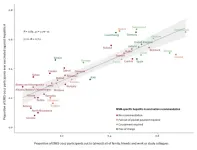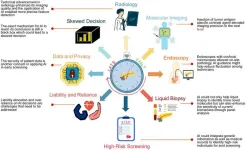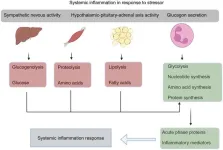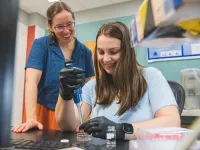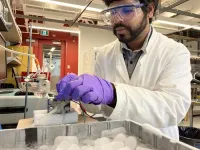(Press-News.org) INDIANAPOLIS – One of the first studies to investigate the prevalence of unrecognized cognitive impairment among patients seen at Federally Qualified Health Centers, has found that it is ubiquitous, especially among minoritized older adults. These facilities provide primary care and preventive services regardless of ability to pay or health insurance status to more than 30 million patients, including a growing number of older adults.
Early and equitable detection of cognitive impairment can benefit patients and their families. Delaying diagnosis leads to poor health outcomes for patients and their care partners and limits access to resources for treatment and care management services.
The study of 204 socially and economically vulnerable older adults (average age 70 years) determined that African American individuals had more than twice the odds of unrecognized cognitive impairment (mild cognitive impairment or dementia).
Approximately 82 percent of Black patients had undiagnosed dementia or mild cognitive impairment, compared with 64 percent of White patients. Only 26 percent of all study participants had no cognitive impairment.
The study population was slightly more than half African American and predominantly female. The association between race and cognitive impairment did not differ by sex, age or years of education.
On average each study participant was receiving primary care for three chronic medical conditions such as diabetes, heart disease, hypertension or chronic obstructive pulmonary disease and they were taking five medications.
To make the diagnosis, patients and family members were interviewed, three years of the patient’s medical records were reviewed, and full comprehensive cognitive testing and neurological examinations were administered.
“We know from our previous work that there is stigma attached with diagnosis of cognitive impairment as well as fear about loss of independence. So, the patient and often their care partner are unlikely to ask that their primary care provider check on the patient’s brain health,” said study senior author Malaz Boustani, M.D., MPH. “To provide quality care and to overcome disparity as well as stigma, we have to develop scalable, timely, equitable and sustainable approaches, strategies, processes and tools for early detection of cognitive impairment in primary care in general and, specifically, in Federally Qualified Health Centers, which predominantly serve low-income and medically underserved communities.
“Early detection would allow patients and care partners access to three recent breakthroughs in brain care. One is the availability of amyloid lowering therapy that can change the trajectory of cognitive and functional decline in people with Alzheimer’s disease. Number two is the new alternative payment model from the Centers for Medicare and Medicaid Services (CMS) to help cover the expenses of providing comprehensive dementia care services, including support for care partners.
“Thirdly early detection opens the door to reduction to the risk for future cognitive impairment by implementing lifestyle changes targeting blood pressure, diabetes, cholesterol, sleep and depression as well as cognitive and physical exercises.”
Using machine learning to extract information recorded in the medical notes of a patient’s electronic health record, Dr. Boustani and colleagues have developed and are testing a low cost, scalable methodology to spot cognitive impairment or facilitate early detection of individuals at risk of developing dementia. They call it zero minute assessment at less than a dollar cost and view it as a culturally sensitive solution -- a healthcare system redesign -- for a problem which the healthcare system doesn't have time or financial capital to solve.
The study authors write, “The differences in diagnoses by race are likely due to both a higher prevalence of dementia in this subgroup and a lack of embedded workflows that support detection and timely diagnosis among these patients owing to patient, physician, and health care factors that need to be addressed urgently.”
“Prevalence of Unrecognized Cognitive Impairment in Federally Qualified Health Centers” is published in JAMA Network Open. The study was funded by the National Institutes of Health’s National Institute on Aging, grant R01AG069765 (PIs: Malaz Boustani, Zina Ben Miled and James Galvin).
Regenstrief Institute study authors in addition to Dr. Boustani are Research Scientist Nicole Fowler, PhD, MHSA, and Arthur Owora, PhD, MPH, and Affiliate Scientist Zina Ben Miled, PhD.
All authors and affiliations, as listed in the publication, are:
Ambar Kulshreshtha1, Erik S Parker2, Nicole R Fowler3,4,5,6, Diana Summanwar6,7, Zina Ben Miled5,6,8, Arthur H Owora9, James E Galvin10, Malaz A Boustani3,4,5,6
1Department of Family and Preventive Medicine, Emory University, Atlanta, Georgia.
2Department of Epidemiology and Biostatistics, Indiana University School of Public Health, Bloomington.
3Department of Medicine, Indiana University School of Medicine, Indianapolis.
4Indiana University Center for Aging Research, Indianapolis.
5Regenstrief Institute, Inc, Indianapolis, Indiana.
6Center for Health Innovation and Implementation Science, Indiana University School of Medicine, Indianapolis.
7Department of Family Medicine, Indiana University School of Medicine, Indianapolis.
8Electrical and Computer Engineering, Indiana University-Purdue University, Indianapolis.
9Department of Pediatrics, Indiana University School of Medicine, Indianapolis.
10Comprehensive Center for Brain Health, Department of Neurology, University of Miami Miller School of Medicine, Boca Raton, Florida.
Malaz Boustani, M.D., MPH
In addition to his role as a research scientist with the Indiana University Center for Aging Research at Regenstrief Institute, Malaz Boustani, M.D., MPH, is the founding director of the Center for Health Innovation and Implementation Science. He is a professor and holds the Richard M. Fairbanks Chair of Aging Research at the Indiana University School of Medicine. Dr. Boustani is also director of care innovation at Eskenazi Health, a Federally Qualified Health Center.
END
Prevalence of unrecognized cognitive impairment in socially and economically vulnerable older adults is high
Rate is twice as high in African American patients as in White patients
2024-11-07
ELSE PRESS RELEASES FROM THIS DATE:
Men who have sex with men in Europe still vulnerable to hepatitis A and B, highlighting need for public health action and support
2024-11-07
Research analysing European survey data from 113,884 men who have sex with men (MSM) and published in Eurosurveillance indicates that while most MSM have a basic understanding of viral hepatitis, only 44% report having been vaccinated against both hepatitis A and B. The data highlight notable immunisation gaps despite available vaccination and recommendations. Strong public health support and creating an open environment that enables MSM to follow recommendations will be crucial to reduce outbreaks among MSM and eliminate hepatitis B.
Men who have sex with men are more likely to get infected with ...
Cancer genetic risk assessment guidelines expand to meet growing understanding of hereditary risk
2024-11-07
PLYMOUTH MEETING, PA [November 7, 2024] — The National Comprehensive Cancer Network® (NCCN®)—an alliance of leading cancer centers focusing on maintaining evidence-based expert consensus driven guidelines for care—announces the publication of the expanded NCCN Clinical Practice Guidelines in Oncology (NCCN Guidelines®) for Genetic/Familial High-Risk Assessment: Breast, Ovarian, Pancreatic, and Prostate. This closely follows the recent publication of the expanded NCCN Guidelines® for Genetic/Familial High-Risk Assessment: Colorectal, Endometrial, and Gastric.
Additional cancer types were added to the title and content for both guidelines. ...
Advances in screening and early diagnosis of pancreatic cancer
2024-11-07
Pancreatic cancer (PC) presents substantial diagnostic challenges due to its aggressive nature and lack of early symptoms, leading to late detection and poor prognosis. According to recent cancer statistics, PC ranks as the fourth leading cause of cancer deaths globally, with increasing incidence, particularly in high-risk regions such as China. Factors such as a shortage of specific and reliable screening markers, along with a lower prevalence in the general population, make effective large-scale screening a formidable tasko assess advancements in diagnostic techniques, artificial intelligence integration, biomarker discoveries, ...
Metabolic dysregulation and metabolite imbalances in acute-on-chronic liver failure: Impact on immune status
2024-11-07
Acute-on-chronic liver failure (ACLF) is a life-threatening condition characterized by acute deterioration of liver function in patients with pre-existing chronic liver disease. It is often accompanied by multiorgan failure and systemic inflammation, with high short-term mortality rates. The triggers for ACLF include bacterial infections, acute alcoholic hepatitis, and ischemic hepatitis, leading to the release of pro-inflammatory mediators. These systemic inflammatory responses result in immune dysfunction, contributing to the progression of the disease.
Recent research has emphasized the metabolic changes ...
Elite coaches see compassion as a path to better performance
2024-11-07
It may sound like a contradiction to talk about compassion in the competitive world of elite sport. After all, isn't elite sport all about becoming hardened to resistance and adversity?
But this is a false dichotomy, according to a new study that analysed the views of 12 Danish high-performance coaches on the use of compassion in their work with elite athletes.
In fact, there is a broad consensus among the coaches, most of whom are head of national teams, about the benefits of using compassion, says the study's lead author, Emilia Backman from the Department of Psychology, University of Copenhagen.
"All of the high-performance ...
Microplastics impact cloud formation, likely affecting weather and climate
2024-11-07
UNIVERSITY PARK, Pa. — Scientists have spotted microplastics, tiny pieces of plastic smaller than 5 millimeters, in some of the most pristine environments on Earth, from the depths of the Mariana Trench to the snow on Mt. Everest to the mountaintop clouds of China and Japan. Microplastics have been detected in human brains, the bellies of sea turtles and the roots of plants. Now, new research led by Penn State scientists reveals that microplastics in the atmosphere could be affecting weather and climate.
The study, published today (Nov 7) in the journal Environmental Science and Technology: ...
ECOG-ACRIN and PrECOG announce multiple presentations at ASH 2024
2024-11-07
Researchers with the ECOG-ACRIN Cancer Research Group (ECOG-ACRIN) and PrECOG, LLC, will present a variety of abstracts that aim to improve treatments for patients with lymphoma and acute leukemias at the 66th American Society of Hematology (ASH) Meeting & Exposition. The meeting is set to occur in San Diego, California, and virtually December 7 - 10, 2024.
Promising results from a phase 2 study (PrE0905) in patients with acute myeloid leukemia and new data from the practice-changing E1910 phase ...
Off-the-shelf thermoelectric generators can upgrade CO2 into chemicals. The combination could help us colonize Mars
2024-11-07
Readily available thermoelectric generators operating under modest temperature differences can power CO2 conversion, according to a proof-of-concept study by chemists at the University of British Columbia (UBC).
The findings open up the intriguing possibility that the temperature differentials encountered in an array of environments—from a typical geothermal installation on Earth to the cold, desolate surface of Mars—could power the conversion of CO2 into a range of useful fuels and chemicals.
“The environment ...
What makes human culture unique?
2024-11-07
Why is human culture — the shared body of knowledge passed down across generations — so much more powerful than animal cultures?
“What’s special about our species?” is a question scientists have wrestled with for centuries, and now a scientist at Arizona State University has a new hypothesis that could change the way we perceive ourselves, and the world around us.
“Ten years ago it was basically accepted that it was the ability of human culture to accumulate and evolve that made us special, but new discoveries about animal behavior are challenging these ideas and forcing us to rethink what makes our cultures, ...
Researchers discover dozens of new genes associated with disc herniations
2024-11-07
Lumbar disc herniation is one of the most common structural changes in the lower back and the most common cause of radiating pain, or sciatica, in the leg.
Hereditary risk factors for disc herniations were investigated in a recently published international study led by a University of Oulu research group, utilising data from FinnGen, the Estonian Biobank, and the UK Biobank. The study analyzed the genetic and health data of 829,699 participants.
The study found 41 novel regions of the genome that modify the disease risk for disc herniations, in addition ...
LAST 30 PRESS RELEASES:
COVID-19 vaccination during pregnancy may help prevent preeclampsia
Menopausal hormone therapy not linked to increased risk of death
Chronic shortage of family doctors in England, reveals BMJ analysis
Booster jabs reduce the risks of COVID-19 deaths, study finds
Screening increases survival rate for stage IV breast cancer by 60%
ACC announces inaugural fellow for the Thad and Gerry Waites Rural Cardiovascular Research Fellowship
University of Oklahoma researchers develop durable hybrid materials for faster radiation detection
Medicaid disenrollment spikes at age 19, study finds
Turning agricultural waste into advanced materials: Review highlights how torrefaction could power a sustainable carbon future
New study warns emerging pollutants in livestock and aquaculture waste may threaten ecosystems and public health
Integrated rice–aquatic farming systems may hold the key to smarter nitrogen use and lower agricultural emissions
Hope for global banana farming in genetic discovery
Mirror image pheromones help beetles swipe right
Prenatal lead exposure related to worse cognitive function in adults
Research alert: Understanding substance use across the full spectrum of sexual identity
Pekingese, Shih Tzu and Staffordshire Bull Terrier among twelve dog breeds at risk of serious breathing condition
Selected dog breeds with most breathing trouble identified in new study
Interplay of class and gender may influence social judgments differently between cultures
Pollen counts can be predicted by machine learning models using meteorological data with more than 80% accuracy even a week ahead, for both grass and birch tree pollen, which could be key in effective
Rewriting our understanding of early hominin dispersal to Eurasia
Rising simultaneous wildfire risk compromises international firefighting efforts
Honey bee "dance floors" can be accurately located with a new method, mapping where in the hive forager bees perform waggle dances to signal the location of pollen and nectar for their nestmates
Exercise and nutritional drinks can reduce the need for care in dementia
Michelson Medical Research Foundation awards $750,000 to rising immunology leaders
SfN announces Early Career Policy Ambassadors Class of 2026
Spiritual practices strongly associated with reduced risk for hazardous alcohol and drug use
Novel vaccine protects against C. diff disease and recurrence
An “electrical” circadian clock balances growth between shoots and roots
Largest study of rare skin cancer in Mexican patients shows its more complex than previously thought
Colonists dredged away Sydney’s natural oyster reefs. Now science knows how best to restore them.
[Press-News.org] Prevalence of unrecognized cognitive impairment in socially and economically vulnerable older adults is highRate is twice as high in African American patients as in White patients
